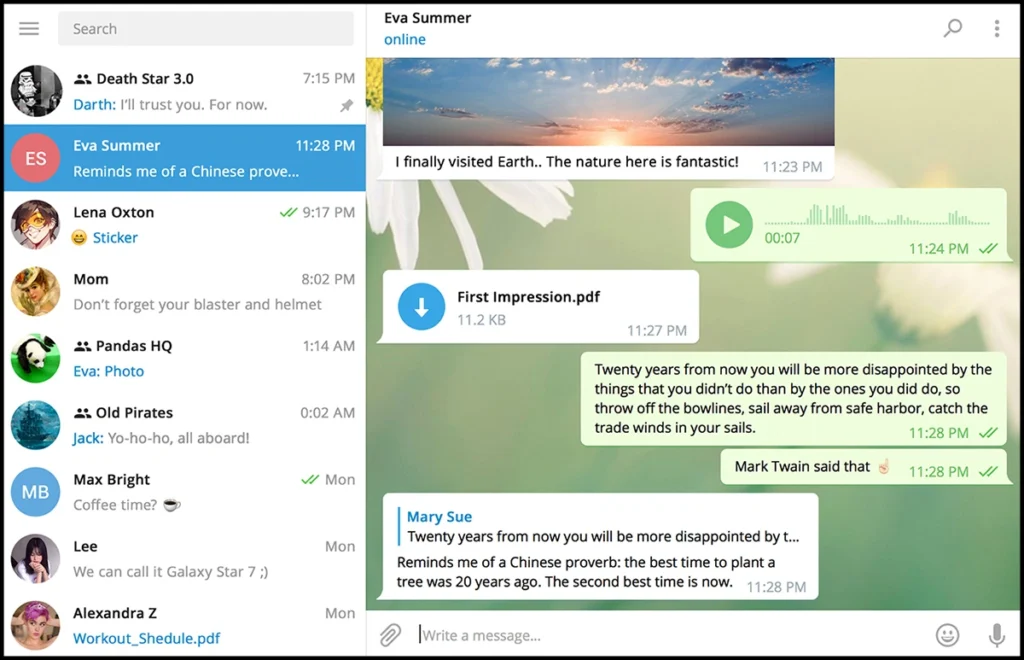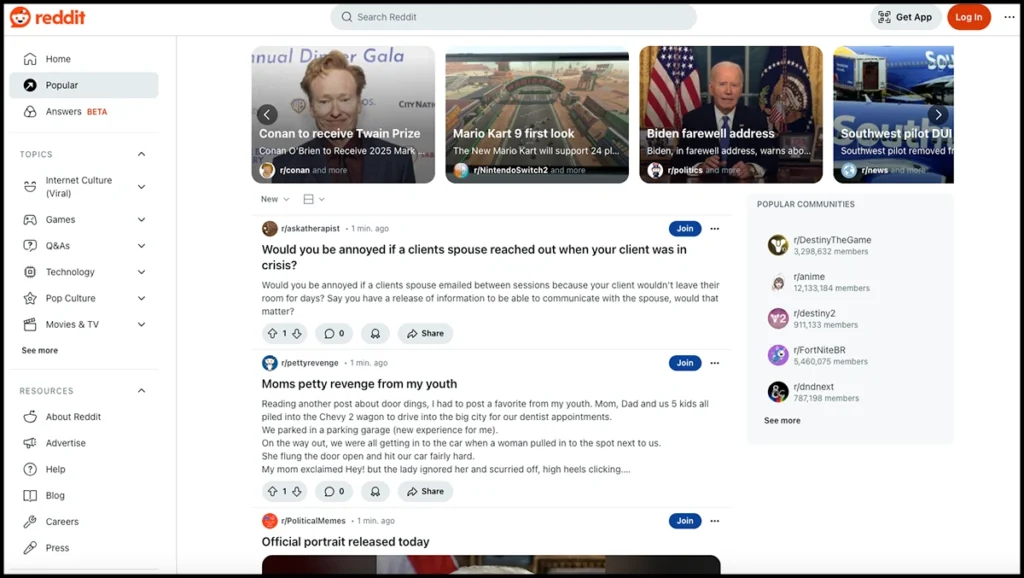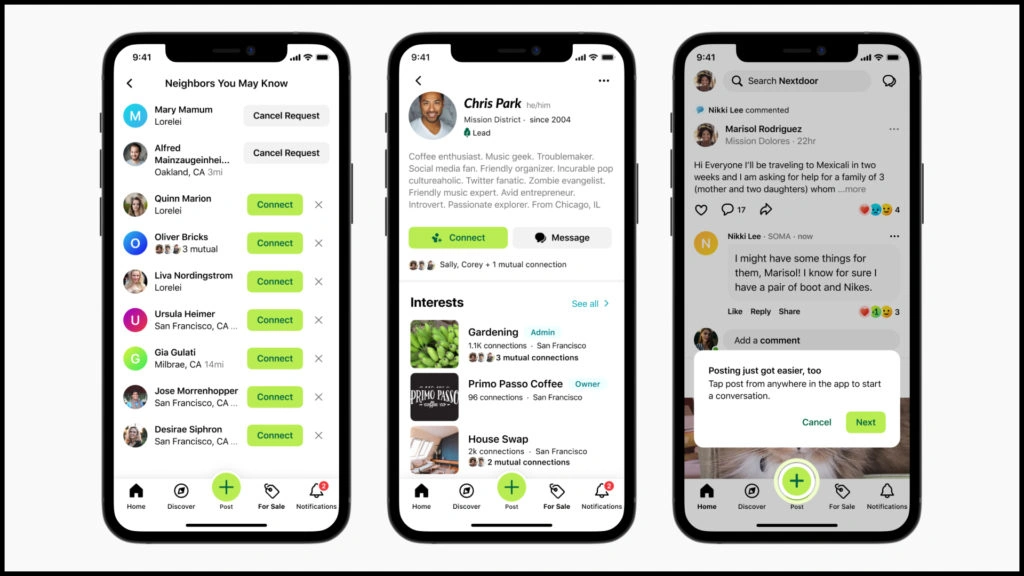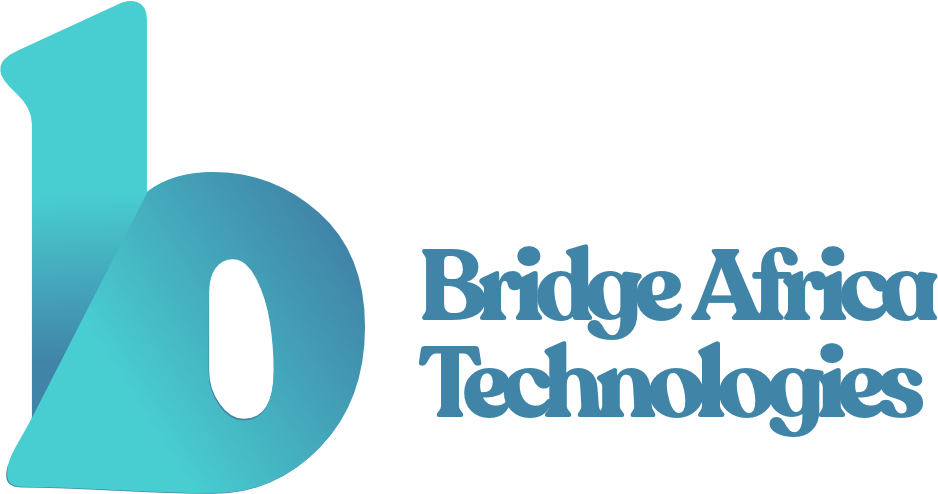Social media today is not only about passing the time — it’s how we connect, get news, and find new friends. Facebook has been one of the largest websites for doing all of the above for many years.
But with so many changes over the years, including privacy concerns, algorithm shifts, and an overload of ads, many people are now looking for other apps like Facebook.
Luckily, there are several Facebook alternatives out there that offer a fresh experience, better privacy, or a completely different way to connect. Whether you want something more private, more fun, or just less noisy, there’s a platform for you.
Let’s explore some of the best alternatives to Facebook — all broken down into easy-to-understand sections.
Table of Contents
Why Are People Looking for Apps Like Facebook?
First of all, let’s talk about why someone would want to use something other than Facebook. Following are some of the best reasons:
- Privacy concerns: Facebook has seen its share of privacy issues over the years.
- Too much advertising: Some people feel that Facebook is one giant advert.
- Data use: Facebook gathers a lot of data on users, which can feel awkward.
- Mental wellbeing: Comparison, negativity, and endless scrolling can be exhausting.
- Trying something new: Occasionally it is pleasant to play around with new apps out of interest.
For all these reasons and more, it only makes sense to know what your options are. The best part is, you don’t have to settle on Facebook either.
Read Also – How to Get Facebook Pixel: A Complete Tutorial for Beginners
What Should You Look for in Apps Like Facebook?
When deciding among apps like Facebook, think about what you enjoy most. Is it chatting with your friends? Sharing photos? Watching videos? Once you have decided that, you will have a better idea of what platform suits you.
Some questions to ask yourself:
- Do you want greater privacy?
- Are you looking to make new friends or just stay in touch with the ones you have?
- Do you enjoy videos, pictures, or written entries?
- Do you want a quieter, smaller community?
Let’s see the top 10 Facebook alternatives that are worth considering.
Also Read – 20 Funny Things to Post on Facebook That Get Likes
Top 10 Apps Like Facebook
1. Vero

If you find Facebook’s ads and algorithms too intrusive, Vero is a clean, simpler, ad-free alternative that emphasizes authenticity and design.
Launched in 2015, Vero features a reverse chronological timeline, no ads, and selective sharing mechanisms. Users can organize connections (e.g., close friends, acquaintances) and share photos, videos, music, and links—all without algorithmic interference.
Popular among artists and celebrities, Vero feels premium, members-only. It’s free currently in its “Founding Member” period but will become subscription-based later.
Pros
- Chronological, algorithm-free feed
- Ad-free experience
- Sleek, creator-friendly design
- Selective sharing options
Cons
- No web version
- Future subscription fees
- Smaller user base than Facebook
2. Minds

Launched in 2015 as a privacy-concerned alternative to Facebook, Minds offers familiar features—profiles, posts, groups—but without data monitoring or algorithmic feeds.
Posts are delivered in chronological order, and users are rewarded with Minds tokens (a native cryptocurrency) for creating engaging posts. The site is open-source, supports anonymous sign-ups, and has end-to-end encrypted messaging.
The price is a free basic usage; $5/month for premium features like monetization tools, promotion of posts, ad-free experience, and verification.
Pros
- No data harvesting or algorithmic feed
- Encrypted messages and anonymous account
- Monetize with crypto rewards
- Open-source for transparency
Cons
- Token system could confuse new users
- Smaller base of users
- Less polished interface than Facebook
Read Also – 50 Best Facebook Posts Ideas for Small Business Owners
3. Instagram

For those who enjoy Facebook functionalities but need more of a visual experience, Instagram is a good choice. Another Meta-owned platform, it includes such instruments as Reels, Stories, Shopping, and tagging—photo and video-based for more artistic storytelling.
Short-form content like Reels and Stories on Instagram keeps users engaged, while businesses are able to show and sell products within posts themselves. Content creators also make money by offering exclusive content in exchange for paid subscriptions.
Even though the platform is free, monetization options allow brands and creators to earn more money directly from followers.
Pros
- Visual-focused with Reels, Stories, and Shopping
- Massive user base, with many being Facebook friends
- Perfect for influencers, creators, and brands
- High engagement through tagging and comments
Cons
- Meta-owned, so privacy issues remain
- Prone to spam comments and messages
- Algorithm can reduce post views
4. Diaspora

Diaspora is a decentralized, open-source social network that gives users total control of their data in their own hands. Instead of centralized servers, it employs independently run “pods” upon which users can choose where their data will live—ideal for individuals who care about their privacy.
It includes regular functionality like status updates, photo sharing, comments, and hashtags, along with some unique features like Aspects, enabling you to categorize contacts for controlled sharing. Diaspora also includes markdown support, polls, two-factor authentication, and anonymous accounts.
The service is entirely free and ad-free and is supported by community-run pods—some of which accept donations but don’t charge for use.
Pros
- Complete data control and storage location
- Regular social features with additional privacy
- No ads and anonymous accounts
- Open-source with community support
Cons
- Old interface
- Picking a pod can be confusing for new users
- Direct messages cannot be erased, only silenced
Also Read – How to Fix Facebook Ad Account Disabled Issue
5. Telegram

With over 500 million users, Telegram has become a top alternative to Facebook, especially for those interested in privacy, speed, and secure messaging. Telegram competes with Facebook Messenger via text and voice messaging, sharing of images, video, and files, and stickers—and with the capacity to service immense group chats and public channels with millions of subscribers.
Telegram is client-side open-source and uses proprietary server technology for data protection. It has self-destructing messages, end-to-end encrypted chat, and seamless access on several devices through cloud-based functionality.
No ads or premium restrictions and the app is completely free of cost.
Pros
- End-to-end encryption and strong privacy measures
- Large group (up to 200,000) and public channel support
- Free, cloud-based, and multi-device support
- Open-source for transparency
Cons
- No traditional news feed—users must manually scan chats
- Less trendy, so others are hard to convert
- More focused on messaging rather than social networking in its entirety
6. Reddit

As a community centered on shared interest and in-depth conversations, Reddit is a lively alternative to Facebook. With thousands of communities based on a specific topic known as subreddits, Reddit provides a platform for users to discuss topics ranging from finance and exercise to conspiracy theories and memes.
Visibility of the content is determined by an upvote/downvote mechanism rather than algorithms, allowing for a more democratic and community-driven platform. The users can stay anonymous and contribute with usernames that don’t include real names or email addresses.
Reddit also gamifies engagement with karma points on well-liked posts and comments to build credibility within the community. While free to visit, Reddit Premium ($5.99/month) removes advertisements, unlocks special features, and rewards Reddit Coins for paying it forward on others’ posts.
Pros
- Huge collection of interest-based communities
- User-voted content selection
- Anonymous participation for honest discussion
- Active moderation to maintain topic on track
- Karma system to promote quality participation
Cons
- Interface and comment threads can be cluttered or confusing
- Not ideal for personal social networking or private messaging
- Quality is spotty—some subreddits are infested with spam or bots
- May be intimidating to new users
7. LinkedIn

While it started out as a job search tool, LinkedIn has become a powerful vehicle for professional networking and career-oriented social interaction. It’s ideal for those who want to be interested in news about the industry, business development, thought leadership, and building high-quality professional relationships.
Members can publish articles, videos, and career achievements on their activity feed, the professional character of the site ensuring the content is informative and meaningful. If you’re a job candidate, business owner, or content creator, LinkedIn offers a platform to connect with people of similar interests.
Other than company pages and job postings, LinkedIn also provides features like Learning for online courses, Stories for fleeting stories, and Creator Mode to develop an individual brand. Premium versions (starting at $14.99/month) unlock salary data, additional job search filters, and in-direct messaging with hiring managers and decision-makers.
Pros
- Specifically designed for professional networking and career growth
- Industry-related content and discussions
- Strong recruitment and job hunting capabilities
- More secure online environment with reduced harassment
- Growing content tools for creators and professionals
Cons
- Not so suitable for casual, personal messaging
- Handling interface for connections may be complex
- Constant unsolicited messages from vendors or recruiters
Read Also – How Can I Fix My Restricted Facebook Account
8. Mastodon

Mastodon gives a refreshing break from the mainstream social networks by embracing decentralization. Instead of being managed by a single company, Mastodon lives through individual self-sustaining servers—each an “instance”—with their own rules and moderation policies. Even with this setup, people can still converse on all servers, creating the illusion of one large, interconnected network.
With no ads, no algorithms, and community-driven moderation, Mastodon puts users in total control of what they see and share—perfect for those who want a social media experience on their own terms.
Mastodon also has a strictly chronological timeline, which means that content shall be shown in the exact posting order. It supports text, images, videos, audio files, polls, and even custom emojis. Content warnings, accessibility descriptions, and animated avatars are added features that make users safer and artists freer.
Because moderation is at the server level, you can join a community that shares your values—create one of your own for complete autonomy. Mastodon is open-source and free, and its open-source status guarantees an open system with community at its heart.
Pros
- Decentralized network allows freedom and flexibility
- Chronological feed without tracking or ad targeting
- Rich multimedia and customization capabilities
- Local moderation builds safer, value-based communities
- Transparent, open-source platform free of corporate control
Cons
- First-time users are perplexed by onboarding
- Smaller global user base compared to mass-market sites
- Hashtag and user discovery by hand needed to build your feed
9. X (previously Twitter)

Over 500 million monthly users, X is among the top sites for live news and trending topics. It’s ideal for people who want to be in the know, participate in global conversations, and tweet directly with public figures, influencers, and journalists.
The site includes a For You feed according to your interests, and hashtags enable you to discover and join conversations of interest. The platform allows you to post text, images, videos, polls, and links. Creators get paid for their content through Creator Subscriptions, offering paying subscribers exclusive posts.
X is free to use, although X Premium ($8/month) unlocks editing of posts, longer tweets, priority replies, and a verified checkmark—ideal for creators and professionals.
Pros
- Great site for up-to-the-minute news, trends, and worldwide conversation
- Immediate contact with public persons and influencers
- Fast, tidy interface for rapid interaction
- Rich multimedia capability for posts
- Great, large, active worldwide population
Cons
- Some trending topics may include spam or inferior content
- Less emphasis on private or family-oriented networking
- Not as intuitive for older or less technologically literate users
10. Nextdoor

Nextdoor is a closed social network intended for neighborhoods, enabling users to connect with others in close proximity to exchange news, ask for advice, recommend services, and get an idea of local events.
It’s ideal for users who are community-oriented but not ideal for users seeking global interactions, as its scope is limited to your immediate surroundings.
The site offers amenities like Neighborhood News for news in the neighborhood, For Sale & Free for selling, purchasing, or giving away items, and Events to organize or locate events in the area.
It also helps advertise local businesses by neighbor recommendations.
Nextdoor is free of cost, though it contains advertisements of local businesses.
Pros
- Builds in-real-life relationships with neighbors
- Great for neighborhood services, events, and recommendations
- Easy and highly localized
Cons
- Requires real name and street address, which have implications for privacy
- Potential for neighbor conflicts
- Includes local ads, which others find intrusive
Also Read – How to Get Free Facebook Likes in 5 Simple Steps
Which Facebook Alternative Is Best for You?
The best Facebook alternative is based on what you want from a social platform:
- Reddit is best if you enjoy discussion by subject and a content system governed by democracy.
- LinkedIn is best if you are a professional seeking career opportunity, networking, and business information.
- Mastodon is perfect for privacy-conscious users who value decentralization and control over what they see.
- X (formerly Twitter) is excellent for giving us minute-by-minute news and trending stories with global reach.
- Nextdoor is perfect for hyperlocal relationships, community posts, and support between neighbors.
No matter what you’re looking for–serious conversations, professional networking, or just more online anonymity–there’s a site that will suit your social style. Experiment with several and find one that feels most right to your goals.
Frequently Asked Questions
Are any of these Facebook competitors free to use?
Yes. All the alternatives like Reddit, Mastodon, Nextdoor, and X are free to use. Some offer paid features through optional subscriptions like LinkedIn Premium and X Premium.
Are Facebook alternatives where I can sell things or locate local services available?
Yes. Nextdoor has a For Sale & Free section where people can buy, sell, or give away products and services locally. It’s ideal for locality-based sales and service recommendations.
Which is the best app for staying on top of news today?
X (formerly Twitter) is still the first choice for breaking news and trending stories. Politicians, journalists, and celebrities use it to share updates in real-time.
What’s the easiest alternative to Facebook?
Nextdoor and LinkedIn are very easy to use for new users. If you’d like an easy setup experience and familiar feed interface, these websites are good starting points.
Final Thoughts
Facebook is still social media’s biggest brand name, but it’s no longer the only choice. If you’re tired of ads, worried about your privacy, or just want to find a different way to connect, there are many great apps like Facebook available that are worth exploring.
Every one of these Facebook alternatives has something special. Some are all about privacy, some are all about creativity, and some are all about actual conversation. The most wonderful news is, you don’t have to delete Facebook right away — you can try out these apps slowly and discover the one that works best for you.
Go ahead, try out these Facebook alternatives, and find the site that feels right for you.

